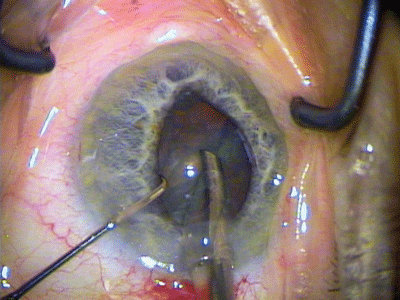More on IFIS
As Dr. Ajamian points out in Decembers Comanagement Q&A column (Flomax Fosters Floppy Iris), intraoperative floppy iris syndrome (IFIS) potentially can cause significant and severe complications during cataract surgery.
Besides the four commercially available alpha-adrenergic receptor antagonists that are listed in the column, optometrists should ask patients if they are taking the herb saw palmetto (serenoa repens). Cases of IFIS have occurred in men taking the herb as a natural treatment to relieve symptoms of benign prostatic hyperplasia (BPH).
 |
| IFIS shows billowing and prolapse of the iris, and intraoperative pupil constriction. |
Currently, a study sponsored by the American Society of Cataract and Refractive Surgery is attempting to identify the best corrective surgical technique for managing IFIS.1 Until the results of this study are available, I have found flexible iris retractors to be an efficient and effective tool in controlling the floppy, billowing iris.2 I have used the iris hooks routinely in all patients who take any of the alpha blockers for BPH. Since incorpor-ating the iris hooks into my phacoemulsification procedure nine months ago, I have not experienced any surgical complications in these patients.
I believe that the significance of IFIS is greatly under-recognized, especially because the elderly population that requires cataract surgery is the same population that exhibits a high incidence of BPH (50% of men older than 50 years and 90% of men older than 85 years).3
Leonid Skorin Jr., O.D., D.O.
Albert Lea, Minn.
1. Ciccone J. ASCRS forms Flomax Working Group. Eye World 2005 Mar;10(3):10.
2. Skorin L, Larsen K. A newly identified miotic syndrome associated with the use of a popular prostate drug. Clin Surg Ophthalmol 2005;23(4):122-8.
3. Ziada A, Rosenblum M, Crawford ED. Benign prostate hyperplasia: an overview. Urology 1999 Mar;53(3 Suppl 3a):1-6.
Foster an O.D.-M.D. Relationship
While eating dinner one evening, my four-year-old son began complaining that his mashed potatoes were touching his chicken. I told him that this was nothing to worry about, but, if he wanted, he could move his chicken to solve his dilemma. However, this was no good. His only acceptable solution was to put each on a separate plate. I told him this was silly and that he would have to use the plate he had. A small tantrum then ensued.
Later that week, I spoke to an ophthalmologist colleague of mine. He told me that a referring ophthalmologist was upset with him because he just learned that my colleague occasionally had optometry residents rotate through his clinic. The referring ophthalmologist told my colleague that if he affiliated himself with optometrists, he would never again refer his patients to my colleague. Upon hearing this, I was taken back to the dinner event with my four-year-old son.
Unfortunately, some optometrists and ophthalmologists become disgruntled when the two touch. However, many of us see the same patientswe work on
the same plateso interaction between the two professions is unavoidable.
We all know that, generally speaking, ophthalmologists are primary caregivers who treat the eye both medically and surgically. Optometrists also are primary caregivers who treat the eye medically and, in some respects, surgically. There is much overlap between the two professions, which complement each other to a large extent. However, a handful of optometrists and ophthalmologists refuse to accept this.
In my observations, this sentiment seems to be most prevalent among those who have been practicing for several years. Okay, Ill say it: those who are looking retirement in the face. Most newcomers seem not to be jaded from the animosity that has existed in the past between optometry and ophthalmology. Today, many optometrists and ophthalmologists practice together, realizing the synergy the two professions have. Both provide primary medical eye care to patients, and both types of doctors recommend surgery to patients who need it. So, how can we propagate this thinking among our colleagues and foster a positive relationship between the two professions? I believe that if both optometrists and ophthalmologists strive to become educated and current with the newest research and practice to the fullest extent of their licenses, then we are on our way.
Regretfully, some physicians will continue to think that optometry and ophthalmology can only exist peacefully on separate plates. I hope my son grows out of this phase soon.
Justin Holt, O.D.
Ogden, Utah
How Do You Bill.?
Dear Dr. Dean:
Thank you for your timely article, Bill Your Patients Medical Insurance (the Right Way), in the February issue. I had been discussing this very issue with my insurance billing person and had come to a conclusion similar to yours, with the difference being in billing a 92000 series code to the medical insurance company.
These questions were raised: Do you bill the refraction to the insurance company or the patient? Do you still bill an examination to a patients vision plan or strictly to the medical insurance? Or, does the answer depend on the diagnosis (routine refraction code vs. medical code)? Do you ever bill 99000 series evaluation and management (E/M) codes for an examination, or only 92000 codes?
Court Thelen, O.D.
Annandale, Va.
Dear Dr. Thelen:
First, the refraction may be billed to one of three entities. If the patients medical insurance has a routine vision benefit, you can safely assume that you may bill the refraction to the carrier. However, if the insurance is a straight medical plan, then the refraction should be billed to the patient or to the patients vision plan as an out-of-network provider only.
Our office never bills examinations to a patients vision plan in-network because we do not accept any vision plans. If you are contracted with a vision plan, the contract language typically requires you to bill the exam to the vision plan only.
Most major medical insurance plans recognize Medicares routine vision exclusion. The purpose of the visit determines the insurance coverage for the service. Medical insurance only pays for routine care if the patient has this as a listed benefit. One would never submit a refractive code to a straight medical plan for an eye exam.
For the exam codes, I almost always bill a 92000 eye exam code for a stand-alone exam. The 99000 E/M codes are best used for follow-up exams and special testing.
This is the short, no-frills version distilled down from a two-hour, COPE-approved lecture I give on the topic. I hope it answers more questions than it provokes. I encourage you to stay diligent in your attempts to implement medical billing in your practice. Its not the easiest thing to learn, but it is rewarding.
D.C. Dean, O.D.
Albuquerque, N.M.
 |
| Medical billing and coding raises many questions among O.D.s. |
I appreciated Dr. Deans article, Bill Your Patients Medical Insurance (the Right Way), in the February issue.
In todays economy, I took the plunge and opened a private practice cold. My goals? Offer patients the best possible care by applying my training and using the latest technologies (and getting paid what I deserve). This required joining medical panels and billing for services.
Theres no comparison between the reimbursements from a medically billed visit versus a vision plan billed visit. However, I also provide for some vision plans. Lets face it, some people just need a vision plan check.
My concern is that several medical insurances refuse to credential optometrists. Ive even explained the situation to patients and asked them to write letters to their insurance companies requesting that I be added to their provider panel. This was so successful with one company that the insurance company called me and asked me to stop having patients send in letters (but we still ask them to send letters).
How else do you gain access to the plans that refuse to credential optometrists? There are two major carriers in my area that cover a large portion of potential patients. However, because their medical insurance will not credential me, they walk out the door without getting the care they need and deserve.
As Dr. Deans final section stated The Battle Rages On. Many O.D.s discuss medically billing what is medical. However, we also need to address insurance companies that refuse to credential O.D.s.
Cory Steed, O.D.
Las Vegas, Nev.

